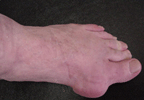I had pre-typed up most of my questions for today's visit. Here are the answers:
Q. My husband had one doctor who told him the lumps on his feet were due to his Scottish heritage. Yet I have read online that they are due to uncontrolled diabetes.
A. Dr. took one look at his feet and said she was not comfortable with them at all. She is going to call his doctor and get an RX for infection ordered for him.
Q. Is the infection in his hand related to gout? I have read that it is.
A. It is most likely related to uncontrolled sugar. The antibiotic should help this as well.
Q. He has had the blister/boil on his toe for weeks now. How long can his body tolerate this before the toe “dies”?
A. A sore like this can be there for quite a long time without the tissue going dead.
Q. When you test your blood sugar, how accurate is the reading? Is there a lag time to events that impact blood sugar? We have a tunnel on I-70, just east of Idaho Springs, and every time you come through it east-bound, everyone slams on their brakes. Sometimes it starts 50 miles west of the tunnel. You never see what made the first car slam on their brakes. But you know that a normal driver would not slam on their brakes to go through a 2 lane tunnel in the middle of the day! Is it possible that a person could be in the process of crashing but their blood sugar levels read normal because that hasn’t caught up with what is already going on inside the body?
A. There is no lag time. As long as your meter is accurate, it is accurate at that moment. But you would need to take it every moment…to know what is going on all the time.
Q. If you only test 3 – 4 times a day, what about all the other moments in the day? I understand that testing gives you a gauge, a measurement, but can you test and be normal and then 30 minutes later be crashing? Is it possible even if it’s not common?
A. You only get a reading for the specific moment that you test. It is possible to crash 30 minutes after a normal reading, depending on what’s going on.
Q. What is the impact that adrenaline has on blood sugar?
A. It goes up.
Q. If you smash your thumb really hard and adrenaline rushes in your body….doesn’t that have an impact on insulin/blood levels?
A. Yes, it goes up.
Q. I’m going to assume it would be a much more acute impact than and event that occurs that has a slower change in release of adrenaline in the system, like an argument with a co-worker or a fight with your spouse?
A. Your blood sugar will go up when adrenaline goes up.
Q. If there are tiny little events that occur all day long that release adrenaline into your system, does the “build up” of these events have an impact on insulin/blood sugar levels?
A. Yes, it goes up.
Q. How fast does the body react to this type of adrenaline build up?
A. No real answer given to this question.
Q. Does weather have an impact on insulin/blood sugar levels? For instance, if it is over 100 degrees, and you go outside for a bit, will there be a change? And if so, is the inverse true that when you go back inside into air conditioning there is a change? I’m simply asking because there is no AC at his parents house and he seems to need more sleep when he is there.
A. She did not know of this, but thought that secondary issues could cause blood sugar to change. For instance, if it is really hot, and you don’t drink enough water, and you become dehydrated, there would be a change in blood sugar. It is often the secondary conditions that cause changes in the blood levels, not the specific event that we are looking at.
Q. Does an illness have an impact on insulin production and blood sugar levels?
A. Yes
Q. Diabetes is a serious of losses. It starts with the addition of medicine and the loss of freedom to live without it. It progresses at various stages. You lose the freedom to eat what you want, then you start loosing body functions. Each loss has to be grieved. The grief process in itself must have some impact on the body’s insulin production and thus the sugar levels?
A. Yes, it does.
Q. If additional grief is added to the equation (loss at work, loss of a family member, etc.) does this impact as well? It seems to me that it would/could.
A. Yes.
Q. Neuropathy is the loss of sensation at the end of nerves?
A. Yes
Q. It happens in the feet, usually first? But it can progress to other areas of the body such as the finger tips, legs, hands arms?
A. Yes.
Q. It can extend to your intestines and cause diabetic diarrhea?
A. Yes
Q. It can affect the nerves that serve the heart?
A. Yes
Q. It can cause low blood sugar unawareness where you do not recognize the signs of hypoglycemia?
A. Yes
Q. And it can cause pain in the thighs, hips, and/or buttocks and lead to weakness in the legs?
A. Yes
Q. It can affect the eyes as well?
A. Yes
Q. When does diabetes have an impact on memory loss? The brain’s fuel is glucose. Extended periods of elevated glucose or low glucose contribute to memory loss?
A. Yes.
Q. High blood sugar causes permanent brain damage?
A. Yes
Q. Low blood sugar alters the brains function and temporarily impairs memory. It’s usually short-term memory. Thus, when blood sugars are low, the diabetic may not remember what was said in a normal conversation?
A. Yes.
Q. High blood sugar causes the nerve endings to be sensitized. The diabetic can be quite agitated and become angry?
A. Yes.
Q. Low blood sugar can cause “hypoglycemic rage”. Is this the body’s normal reaction to low blood sugar? You get angry, adrenaline kicks in, insulin is produced, blood sugar levels rise? Anger drives up blood sugar levels. Yet, due to the impaired memory function of low blood sugar, the diabetic may not remember that they were angry?
A. Yes.
Q. If the body reacts to low blood sugar by overcompensating, which results in high blood sugar (the Somogyi effect) and this is going on inside the body in a non-stop fashion, could actual blood sugar readings appear normal when in fact, they are not?
A. Yes. The liver stores sugar and when blood sugars drop, the liver will release a gush of glucose into the system. This happens regardless of anything else going on. What we want to do in this case is to shut down the liver. Even if blood sugars go high for a few days. You do this by decreasing the amount of insulin. Shut down the liver until we can stop the lows, which will level out the blood sugars.
You can actually have a low, the liver releases glucose and you go past “normal” into a high. You then take insulin, which puts you back to the low…and this cycle is known as the Somogyi effect. Again, the way to treat this is to shut down the liver, stop the lows, go for high for a short period of time, then bring the “highs” back down.
Q. I have been told that this is not my disease. I understand the premise of that concept. However, the impacts of this disease are in my life 24/7. I need to know how I can live day-to-day without living with the impacts of this disease. It is in my life 24/7. So, although this is not MY disease, this is MY life, and the disease is a huge part of my life. How do I live with the insane decisions that are made? The decisions that are made with no discussion with me? The decisions that do have an impact on my life that I have no input into? How do I live with the angry outbursts that are pointed directly at me? Words do hurt. Even when your brain tells you they were spoken during a low blood sugar outburst.
A. I understand your frustration and I do agree that although this is not your disease, you do have to live with this disease all the time. What the 2 of you have to do is to come to some kind of agreement as to what to do about decision making. When a diabetic is in a low, it is not the time to make any kind of decisions.
Q. OK, but if he continues to make decisions when he is in a low…and I have to continue to live with the outcomes of those decisions….what do I do next?
A. You have to make the choice to live with it, or to move on.
Q. Let’s say that he makes a decision to continue as he has. It is his life and he wants to live it like he wants. What choices do I have? What are my options?
A. It is obvious that the 2 of you have a lot of issues to work out. But as for the diabetes. It is his life. It is his decision. You cannot make the choice for him. If he chooses to not take care of himself, then you will have to decide what to do with that choice. Can you continue to live with him knowing that he is not going to take care of himself? It is a difficult decision.
We had a lengthy discussion after that about his current blood levels. When she wrote them on a grid, it went something like this:
Morning Noon Dinner Bedtime
159 90 90 110
125 152 145 130
115 100 159 128
90 98 120 115
And his A1c is 6.3. Which he has always said to me is in good, normal range. But she explained it a bit differently. She said that in order to get an A1c of 6.3, your blood sugars would range between 90 and 120. So for every time in the grid above that he has gone above 120, he has also gone below 90. So the 6.3 is NOT a good reading because he is having too many lows.
She asked him how many lows he had per week and he said 2. She said from looking at just the past 4 days, he must be having more than 2 per week and not being aware that they were occurring. She added that this desensitization to levels is normal in someone with as much kidney failure as he has.
She recommended that he change his diet and eat at least 60 grams of carbs per meal, 3 times per day. She wants him to keep his AM insulin the same, but split out the evening. Leave the R the same at 6 pm and drop the N to 40 at 10 pm. He was not happy about adding a 3rd shot per day, but agreed to try this starting tonight for the next 5 days. He agreed that if his sugar goes over 200 he will continue, but if it goes over 300, he will stop. He is to call her in a week for an update.
I feel a little better…that at least all the questions I had written down, for the most part, received the same answers as what I had found online. And I am relieved that when she looked at his feet, she was as concerned as I have been.
I felt when we walked out of her office that he was a time bomb waiting to go off. I’m sure this will come back to haunt me….and that is why I am writing up these notes…to remind him of our conversation with her.
My next step…seeking marriage counseling from a regular counselor. My hope is that if his blood sugars can get regulated, then we can move on to working together to resolve the other problems….which may well go away if/when the blood sugars can be regulated.
Thursday, August 24, 2006
Subscribe to:
Post Comments (Atom)



1 comment:
Thank you for caring! I posted an update tonight. I will try to do better about posting. Sometimes...it's just too hard!
Thanks! :o)
Post a Comment